Chinese Geriatric Society Psychiatry and Mental Health Branch "Early AD diagnosis and treatment path psychiatry practice guidance promotion training" was held in Beijing
2024-11-06 22:27:00 Source: 中国老年医学学会
On November 4, 2024, sponsored by the Psychiatry and Mental Health Branch of the Chinese Geriatric Society and hosted by the Sixth Hospital of Peking University, the "Early AD Diagnosis and Treatment Path Psychiatric Practice Guidance and Promotion Training" was successfully held in the Qiongyuan Lecture Hall of Peking University Medical Library. This training activity is closely focused on the "Early Alzheimer's Disease Diagnosis and Treatment Path of Psychiatry Practice Guide" (published in the Chinese Journal of Psychiatry), the core purpose is to improve the early recognition and intervention skills of Chinese psychiatrists for Alzheimer's disease (AD). And then promote the scientific and standardized diagnosis and treatment path to be effectively applied in practice.
The number of people with Alzheimer's disease (AD) is increasing with the acceleration of the aging process, placing a heavy burden on families and society. This year, AD has made important advances in the field of disease modification, with novel drugs and therapeutic strategies targeting Aβ protein deposition aimed at slowing the disease process. Early diagnosis and timely intervention are crucial to the treatment of AD, which can delay disease progression and improve quality of life. Multidisciplinary team collaboration is integral to the diagnosis and treatment of AD, integrating resources in the fields of neurology, neuroimaging, neuropsychology, pharmacy and nursing to provide patients with a comprehensive personalized treatment plan. With the strengthening of research and cooperation, more effective treatments are expected to be introduced in the future, bringing new hope to AD patients. The training brought together many authoritative experts and senior researchers in the medical field, including Academician Lu Lin, Academician of Chinese Academy of Sciences and President of Peking University Sixth Hospital, Director Chang Jing, editorial director of Chinese Journal of Psychiatry, and Professor Sun Hongqiang, vice president of Peking University Sixth Hospital. Professor Yu Xin, Honorary President of Psychiatry and Mental Health Branch of Chinese Geriatric Society, Director of the Key Laboratory of Translational Medicine for Dementia Diagnosis and Treatment, Peking University Sixth Hospital, and Professor Wang Huali, President of the Branch, Director of Clinical Research Center and Executive director of Memory Disorder Diagnosis and Treatment and Research Center, Peking University Sixth Hospital, etc. In addition, Professor Liu Ying, Deputy Director of the Department of Radiology, Peking University Third Hospital; Professor Yuan Junliang, Director of the Department of Neurology, Peking University Sixth Hospital; Professor Shi Chuan, Director of the Quality Office and director of the research ward; Associate Researcher Li Peng, Director of the Department of Radiology; and Director Guo Haifei, director of the Department of Pharmacy, also came to the scene to give wonderful reports and special topics.
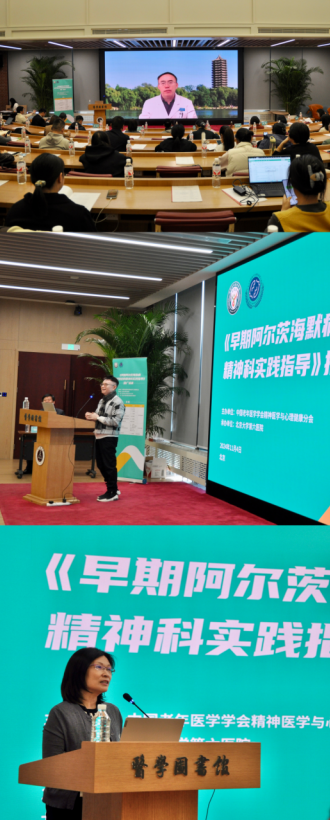
Academician Lu Lin, Professor Yu Xin and Director Chang Jing delivered opening remarks
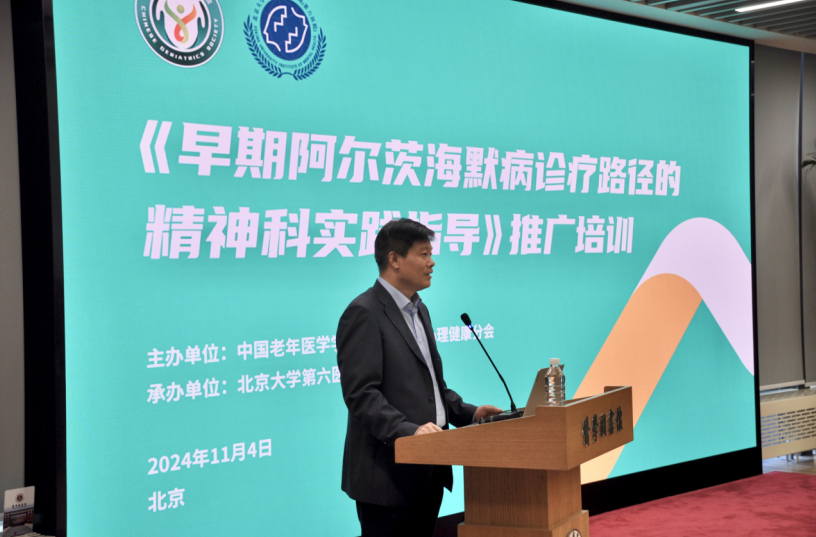
Professor Sun Hongqiang chaired the meeting
Experts focused on key topics such as the pathological mechanism of Alzheimer's disease, early diagnosis techniques, whole-process management strategies and the latest advances in drug treatment, and conducted in-depth explanations and warm in-depth discussions, offering a wonderful knowledge feast for participants. The training was hosted by Professor Sun Hongqiang.
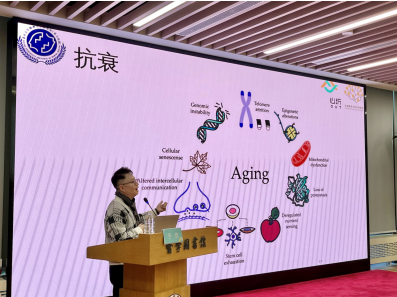
Professor Yu Xin pointed out in the academic report that AD drug therapy is shifting from symptomatic therapy to disease-modifying therapy, that is, targeting Aβ and tau protein deposition. He introduced new drugs and their research to slow or stop the progression of AD, provide psychiatrists with more treatment options, and promote scientific and standardized treatment paths.
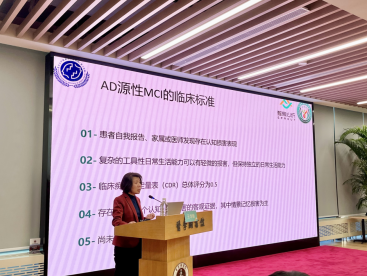
Professor Wang Huali explained in detail the practical guidance of early AD psychiatric clinical diagnosis and treatment, focusing on the key steps of early AD diagnosis - identifying suspected patients, making clinical diagnosis and confirming the biological diagnosis of AD origin. At the same time, the treatment plan of early AD, especially the clinical application of amyloidomumab therapy, was explained in detail.
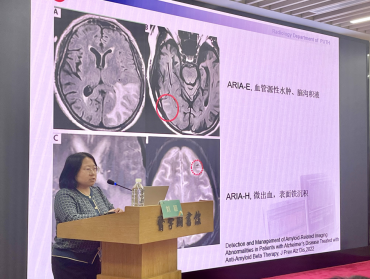
Professor Liu Ying gave A special lecture on "Recognition of Amyloid-related Imaging Abnormalities", explaining in detail the brain imaging manifestations of anti-Aβ drug-related vasculitic edema and hemorrhage, namely amyloid-related imaging abnormalities (ARIA), and describing in detail the specific manifestations and identification methods on MRI. It provides guidance for the evaluation of ARIA when using anti-Aβ therapy.
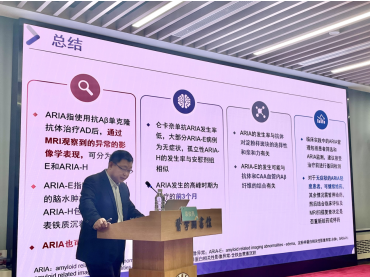
Professor Yuan Junliang made A detailed introduction on the pathogenesis, identification and management measures of ARIA, providing practical guidance for the clinical use of Aβ-mab drugs.
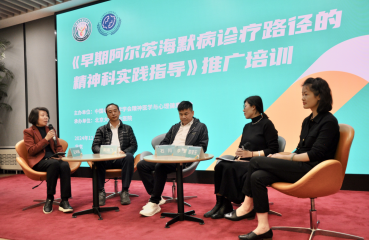
Experts Roundtable Forum (from left to right: Wang Huali, Guo Haifei, Shi Chuan, Li Peng, Chen Baoyu)
Subsequently, Professor Wang Huali chaired a roundtable forum and had an in-depth discussion on multidisciplinary team collaboration in early AD diagnosis and treatment with experts such as Professor Shi Chuan, Associate Researcher Li Peng, Director Guo Haifei and Head Nurse Chen Baoyu.
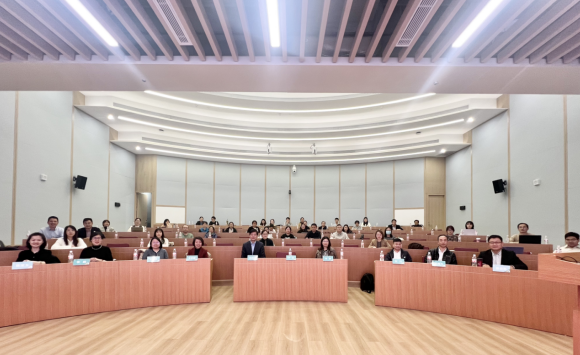
Group photo of some participants
The training was highly appreciated by the participants, who said they would apply the knowledge to practical work to provide better medical services for patients with early Alzheimer's disease. Professor Wang Huali pointed out in his conclusion that with the progress of aging society, the diagnosis and treatment of early Alzheimer's disease deserves the high attention of professionals in the field of geriatric psychiatry. Doing a good job in the standardized diagnosis and treatment of such patients will help improve the quality of medical services and maximize the benefits of patients. She said that the Psychiatry and Mental Health Branch of the Chinese Geriatric Society will continue to devote itself to professional training and knowledge dissemination in the field of geriatric mental health, promote the scientific diagnosis, treatment and management of Alzheimer's disease, and make more contributions to the realization of healthy aging.
Written by: Caixia Xie and Haifeng Zhang
Review: Wu Donghui Wang Huali
Prev
The Beijing Medical University's Academic Conference on Ultrasound for Geriatric Vascular and Musculoskeletal Diseases and the Fourth Premium Learning Class on Renal Artery Contrast-Enhanced Ultrasound were successfully held in Beijing, aiming to empower the development of Elderly health through Leading by example
Next
【 Notice 】 Class will start soon! Stay tuned!

